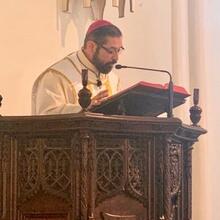Below is the address that Bishop Daniel E. Flores made to the fall assembly of the U.S. Conference of Catholic Bishops on Nov. 14. Bishop Flores attended the first session of the Synod on Synodality in Rome, Oct. 4 to Oct. 29, as a voting member. A second session of the synod will be held in Rome in October 2024.
We are now in the “between time”—when we can reflect on the synthesis of the first session, and prepare ourselves for the second session. I anticipate that the secretariat for the synod and the synod office of the [U.S. Conference of Catholic Bishops] will be sending some resource material for us to use with our people during this interim.
When you read the interim document, you will find it raises thoughtful questions of pastoral and theological import. Some might say that contentious questions are raised. I can say that many difficult issues were raised, but they were not discussed in a contentious way. This in itself is remarkable. At its most basic, the term synodality describes a properly ecclesial style that prioritizes regular conversational interactions among the people of God as decisions are made for the sake of the mission the Lord gave to the church. The “Conversation in the Spirit” method utilized during our local gatherings and at the Synod of Bishops this last October is one effective way to promote this aim. This does not preclude the development of other conversational methods.
[Related: 15 hidden gems in the Synod report that could lead to major church reforms]
Conversation, as the Latin root suggests, implies more than talking and listening. It involves sharing a way and a style of life, a style of communal life described succinctly by St. Paul in Galatians 5:22, marked by love, joy, peace, patience, kindness, generosity, faithfulness, gentleness, self-control. This wider sense of the word [conversation] as a way of life is echoed in [the third part of Summa Theologiae] when St. Thomas asks about the Conversatio Christi. He speaks this way when referring to the Lord’s habitual manner of life. St. Thomas notes how the Lord Jesus intentionally moved and spoke easily among the people so as to instill in us confidence to approach Him, and through our approach receive the mercy he offers for the salvation of us sinners. This grace of approachability inaugurates the grace of the Kingdom (Summa Theologiae III, q. 40, a. 1).
This is his conversatio. We could say the conversations of the synod are for the sake of building up an ethos, the conversatio of communion and confidence in the accessibility of Christ as He manifests himself in the church. Our mission is meant to mirror his. The point is accessibility to Christ. The endeavor, we pray, is to be animated by the Spirit, who purifies and elevates our conversatio in every way.
In its primary instantiation, the synodal Conversatio Christi is local and particular. You cannot really listen to, or speak with, or share an ethos with people in general. In the church, though, the particular life of the community, our conversatio, can bear the sacramental imprint of the whole. Thus, in its flesh and blood particularity, the local is already a manifestation of the Catholic mystery, since the Catholicity of the church is sacramentally embodied in each community gathered around the local bishop, celebrating the Eucharist, living and often dying in witness to the faith in Christ we profess together. St. Ignatius of Antioch witnesses to this, and “Lumen Gentium” explicates it. Communio lived in the conversatio is already an expression of the mission of the church, since we are called to be an anticipatory sign of the tribes, nations and tongues gathered around the heavenly throne of the Lamb who was slain.
During the gathering in Rome, great attention was given to how our sense of mission can flow more cohesively from the communion that baptism generates. For example, many local churches seem at times to experience a disconnect between the church as communion and the church as evangelizing mission; and between the evangelizing mission and our public witness of charity and social justice; and between the public witness of charity and justice, and the eschatological horizon that the redemption anticipates. How can we better manifest the cohesiveness of the mystery we live?
Thus, the third section of the interim report asks about synodal approaches to formation, and about the church’s pastoral structures governing participation in various aspects of ecclesial life. All of this leads to reflection—and will ultimately lead to decisions—about how the conversatio can be promoted within the structures of the church’s life to encourage a more conscious engagement in the mission in all its variously related aspects. The whole body has many gifts to put to the service of the mission. That the laity, by virtue of baptism, have an indispensable role in the mission of the church is not in doubt. The questions are about how co-responsibility can be encouraged and facilitated in a way that respects the doctrinal principles that undergird ecclesial life and sound pastoral practice. Structure alone, of course, cannot ensure a Christian way of life and mission shared and promoted in common; for without the Spirit, the letter is dead.
As we read the interim report of the synod, we can hear the many issues that the local churches grapple with globally. The synod offers us a Catholic way to do so faithfully, realistically, prayerfully, thoughtfully and charitably. We have a lot of work to do, but we, together with our people, need to be actively involved in the conversation.
Finally, I want to close by giving special thanks to all of our U.S. delegates for their witness, and good humor. They “done us proud”, as we say in Texas. We all learned a lot, and we laughed a lot. And I thank God for the friendships fostered during our time together.







